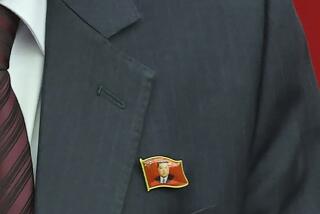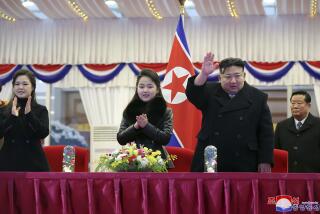N. Koreans Pledge Loyalty to Kim’s Son
- Share via
SEOUL — Hundreds of thousands of North Koreans assembled solemnly in Pyongyang today to pledge loyalty to Kim Jong Il, son of late North Korean dictator Kim Il Sung, a day after a tear-filled funeral for the only leader in the Stalinist state’s 46-year history.
The younger Kim, dressed in a dark gray suit decorated only by a Kim Il Sung badge, appeared haggard as he stood expressionless on a dais overlooking Kim Il Sung Square as four of his countrymen delivered eulogies to his father and offered oaths of loyalty to him.
Flanking Kim were Defense Minister O Chin U, the most influential leader of the 1.1-million-strong armed forces, and Prime Minister Kang Song San.
Kim, true to his reputation, remained silent. And nothing in the telecast, which was broadcast overseas live by CNN, officially confirmed that the eldest son had assumed the three key posts of power that his father had held before he died July 8.
In his eulogy, Kim Kwang Jin, a deputy chief of the general staff of the army, praised the late leader for making “our military forces undefeatable. The dignity of the nation can only be maintained on the strength of arms.”
He declared that the armed forces “will protect and support Kim Jong Il with our lives.”
In the only sign of future policy direction, Kim Kwang Jin condemned South Korea for declaring a military alert immediately after the announcement of Kim Il Sung’s death and for suppressing students’ desires to express condolences. Until the “Great Leader’s” death, a first-ever meeting of presidents of the two governments on the peninsula had been scheduled and a mood of hope for reconciliation had emerged.
At noon today, North Koreans stopped to offer a three-minute silent prayer as trains and street cars blew their horns and whistles in tribute to the late leader.
On Tuesday, in an outpouring of tears and wailing, more than 2 million North Koreans bade farewell to the late president in a funeral and a procession through the streets of the showcase capital.
Broadcasts from North Korea showed masses of shattered mourners, indicating the degree to which Kim Il Sung, over nearly half a century, had molded his people into a monolithic, Orwellian nation. It now will apparently place itself, at least initially, at the bidding of his son.
TV announcers tearfully repeated declarations of sorrow and occasionally added pledges of respect and allegiance to Kim Jong Il.
A flower-framed portrait of Kim Il Sung--three times the size of the car on which it was mounted--was followed in the funeral procession by a massive wreath atop another vehicle that bore a ribbon with Kim Jong Il’s name on it.
North Korean TV failed to specify whether the late president would be buried or his body preserved, as were those of Asia’s two other major Communist leaders--Mao Tse-tung of China and Ho Chi Minh of Vietnam.
Kim Jong Il, 52, took over command of the armed forces in December, 1991, but his father retained the other key posts of chairman of the Korean Workers Party and its central military committee and chief of state, or president.
The younger Kim is expected to assume all three posts, although no experts or analysts can say for sure what that will mean.
In a statement that offered little insight, Radio Pyongyang said Monday that Kim Jong Il, who already had been running the government on a day-to-day basis before his father’s death, would continue Kim Il Sung’s policies.
In large part, the outpouring of emotion in the North in the wake of Kim Il Sung’s death can be traced, analysts said, to decades of brainwashing that led North Koreans to believe that it was the United States that invaded their country and launched the 1950-53 Korean War.
In North Koreans’ view, Kim Il Sung defeated the Americans and preserved the North’s independence. North Koreans also believe that he alone--and not the United States and its atomic bombs--defeated Japan in World War II and liberated Korea from 35 years of colonialism.
More to Read
Sign up for Essential California
The most important California stories and recommendations in your inbox every morning.
You may occasionally receive promotional content from the Los Angeles Times.













